Hydration is a cornerstone of health, regardless of age. But when it comes to our littlest ones, the principles and guidelines of hydration aren’t quite the same as they are for adults. Babies have unique needs and sensitivities, making it vital for parents and caregivers to understand the best practices for keeping them well-hydrated. Unfortunately, a swirl of myths and misconceptions often cloud the waters of truth, leading to misguided practices that can affect a baby’s well-being.
In this article, we’ll debunk some of these myths and shed light on the actual best practices for ensuring your baby remains happy, hydrated, and healthy. Whether you’re a new parent or an experienced one, there’s always something new to learn about the fascinating journey of parenthood, especially when it comes to the fluid needs of your little bundle of joy.
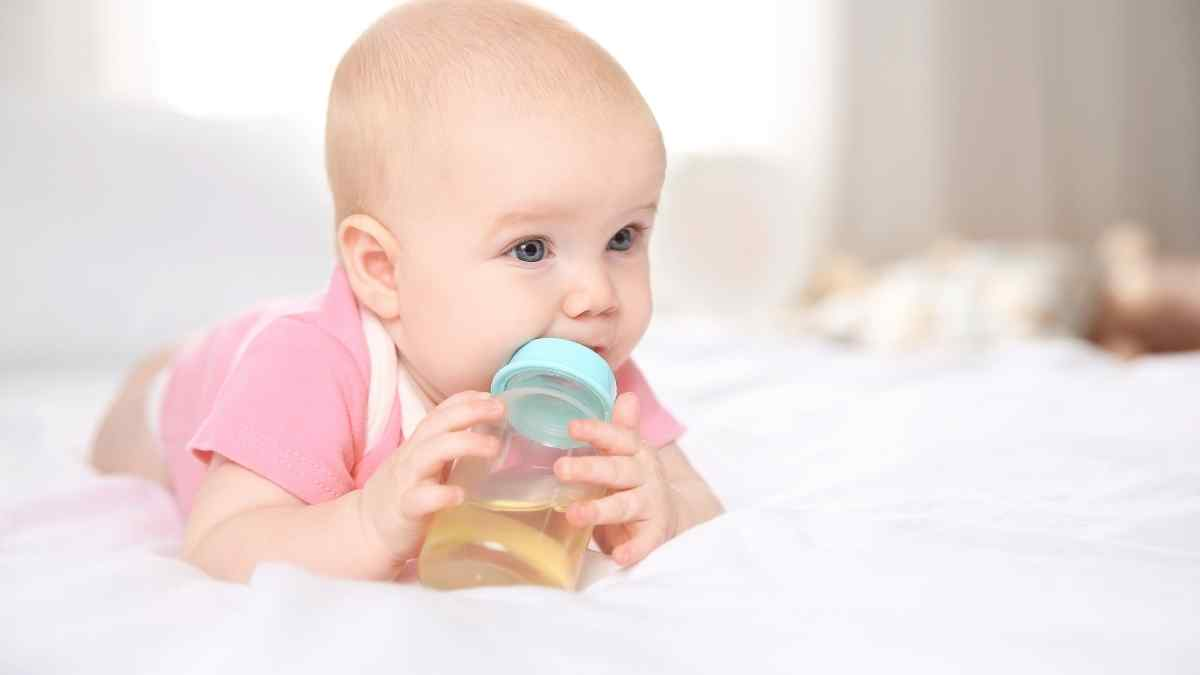
Myth 1: Newborns Need Water
It’s a persistent myth: the notion that just like adults, newborns need to be drinking water to maintain an adequate water balance. After all, haven’t we always heard that everyone should drink at least eight glasses of water a day? But when it comes to infants, the same hydration rules don’t apply.
Explanation: Newborns are a unique bunch with specific needs. Unlike adults who might grab a sports drink after a long workout or chug glasses of water after a salty snack, newborns are receiving all the hydration they need from breast milk or formula. These provide not only the adequate hydration for them but also essential nutrients to support growth and development.
The belief that infants, like adults, need to drink water is largely rooted in misunderstandings. For instance, while adults might turn to sports drinks after sweating it out for more than an hour, or even use salt packets to replace salt and other electrolytes lost, infants don’t have the same hydration needs or patterns. They don’t munch on salty snacks, nor do they require sports drinks or non-caffeinated drinks to stay hydrated.
Risks of giving water to newborns: The notion of “more is better” can be misleading when it comes to newborns and water. Drinking excessive amounts of water can lead to a condition called water toxicity or water intoxication. This happens when large amounts of water dilute the body’s salt concentration. In adults, symptoms might manifest as severe muscle cramps or even kidney failure. In newborns, the risks are even more pronounced.
Giving an infant too much water can make their cells swell. This can lead to severe complications, including seizures. Newborns’ kidneys are also not mature enough to process large amounts of water, leading to a dangerous imbalance in their body’s salt and fluid intake. And while adults might look at caffeinated drinks consumed or higher alcohol content beverages as factors affecting their hydration, for newborns, the introduction of even small amounts of water can be problematic.
Furthermore, with their immature digestive systems, drinking water can make infants feel full. This might lead them to drink less breast milk or formula, depriving them of essential nutrients. Drinking water at a young age can also increase the risk of medical conditions such as urinary tract infections.
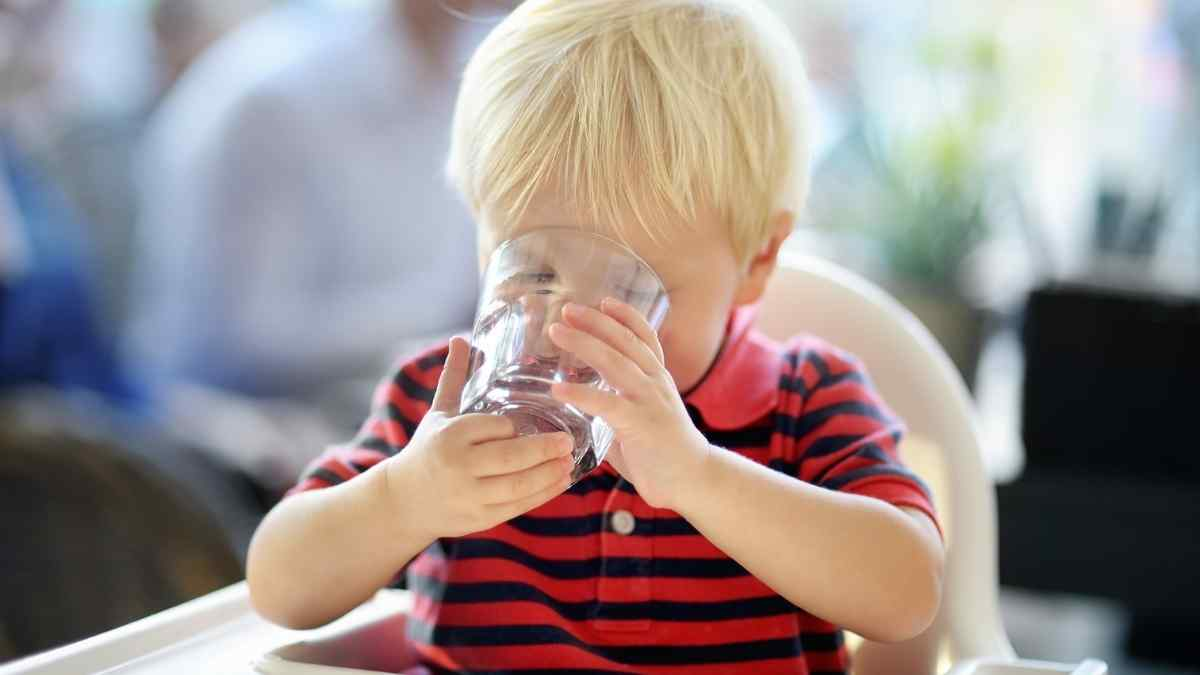
Myth 2: Teething Babies Need Extra Water
Transitioning from our earlier discussion on the misconception that newborns require drinking water for hydration, another prevalent myth often surfaces as babies grow older and start teething. Parents, eager to provide relief to their little ones, sometimes believe that teething babies need extra water. Let’s delve into the origins of this myth and the science behind teething and hydration.
Why parents believe this myth
1. Symptoms Mimic Dehydration: Teething can be accompanied by symptoms that are sometimes mistaken for mild dehydration. A dry mouth, for instance, is common in teething babies due to their constantly tasting or sucking on their hands, toys, or anything they can grab. Parents might interpret this as a need for drinking water.
2. Misinformation and Tradition: Just as there’s a hard and fast rule propagated about adults needing to drink at least eight glasses of water a day, there are traditions and old wives’ tales suggesting that teething babies require extra water. These myths are often passed down through generations or found in outdated literature.
3. Seeking Comfort: Since babies experience discomfort during teething, they might fuss or cry more. Some parents equate this increased fussiness with a need to drink water or even a mild sports drink, believing that hydration might soothe them.
The truth about teething and hydration
1. No Direct Connection: Contrary to popular belief, teething does not increase a baby’s fluid intake requirements. While older infants who have started on solid foods might require some water, it’s not directly because of teething.
2. Risks Still Present: As we highlighted in the previous section, excessive water intake can lead to so-called water toxicity. The body’s thirst mechanism in infants is still developing, and they might drink more than what’s necessary if given constant access. It’s crucial to monitor water intake to ensure it doesn’t interfere with milk or formula consumption, which are primary sources of nutrition.
3. Other Remedies Are More Effective: Instead of reaching for a sports drink or sweet juices to remedy dehydration symptoms mistakenly attributed to teething, parents can offer cold teething rings, gentle gum massages, or even consult a pediatrician for pain relief recommendations.
In the light of sports science, exercise physiology laboratories, and clinical nutrition research focusing on hydration, it’s essential to remember that while certain groups, like ultra-marathon runners or those with specific health conditions, might have specialized hydration needs, infants — whether they’re teething or not — have their unique requirements. They primarily rely on breast milk or formula, and any introduction of water should be made cautiously and in consultation with healthcare professionals.
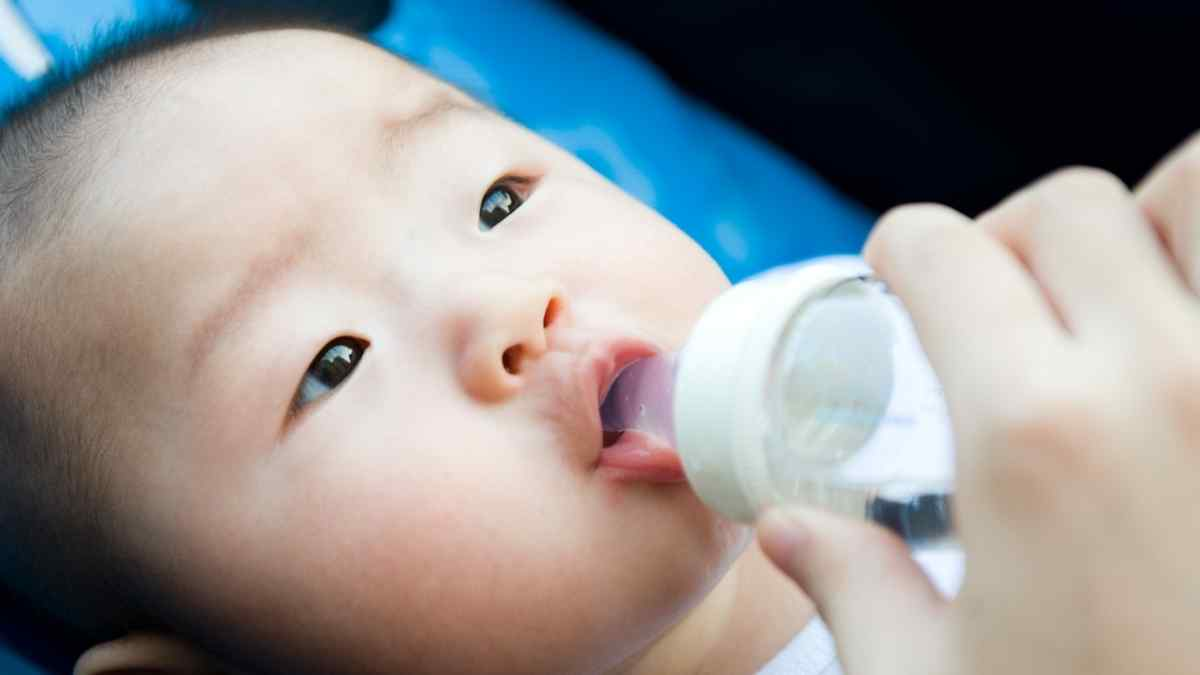
Myth 3: A Sweaty Baby is a Dehydrated Baby
Having navigated the intricate waters of teething and hydration, another widespread myth emerges on the horizon: the belief that a sweaty baby is indicative of dehydration. This misconception stems from our associations with sweating in adults, often linked to exercise, heat, or dehydration. Let’s unpack this myth and dive into the science of baby sweat and what truly indicates dehydration in our little ones.
Discussing the body’s cooling mechanism
1. Natural Thermoregulation: Sweating is the body’s natural mechanism to regulate body temperature. Babies, with their developing thermoregulation systems, can sweat even when they’re perfectly hydrated, especially during hot weather, after a meal, or during sleep.
2. Not Always Linked to Activity: Unlike adults, who might need a sports drink after intense activity or might drink water profusely after losing fluids from sweating, babies sweat even when they’re not being particularly active. Their sweat glands are still maturing, and they might sweat more than older children or adults in the same conditions.
3. Different Sweat Patterns: Research from exercise physiology laboratories shows that the concentration of salts and other elements in baby sweat can be different from that of adults. So, while an adult might grab salt packets or sip on low alcohol content beverages to replace lost electrolytes after sweating, a baby’s sweat doesn’t necessarily indicate the same hydration needs.
How to actually identify signs of dehydration in babies
1. Urine Output: One of the most reliable indicators of hydration in babies is urine production. Dark colored pee or a significant decrease in wet diapers can signal dehydration. Remember, dark colored pee means the body is concentrating urine due to low fluid levels.
2. Physical Signs: Severe dehydration symptoms in babies can include a sunken soft spot on their head, dry mouth and lips, and fewer tears when crying. They might also be more irritable or lethargic than usual.
3. Weight Loss: Babies who lose weight rapidly or fail to gain weight might not be getting enough fluids. It’s essential to monitor their weight, especially during sickness, when fluid intake can be compromised.
4. Medical Conditions: Some health conditions can increase the risk of dehydration in babies. Kidney disease, liver dysfunction, or certain other medical conditions can affect how the body responds to and processes fluids.
It’s tempting to equate our own hydration cues, like reaching for sugary beverages when we have a dry mouth or using liquids to remedy dehydration after intense exercise, to our babies’ needs. Still, their systems are much different from ours. While multiple scientific databases and life kit talks may provide vast knowledge on staying hydrated for adults, understanding infant hydration requires a specialized lens.
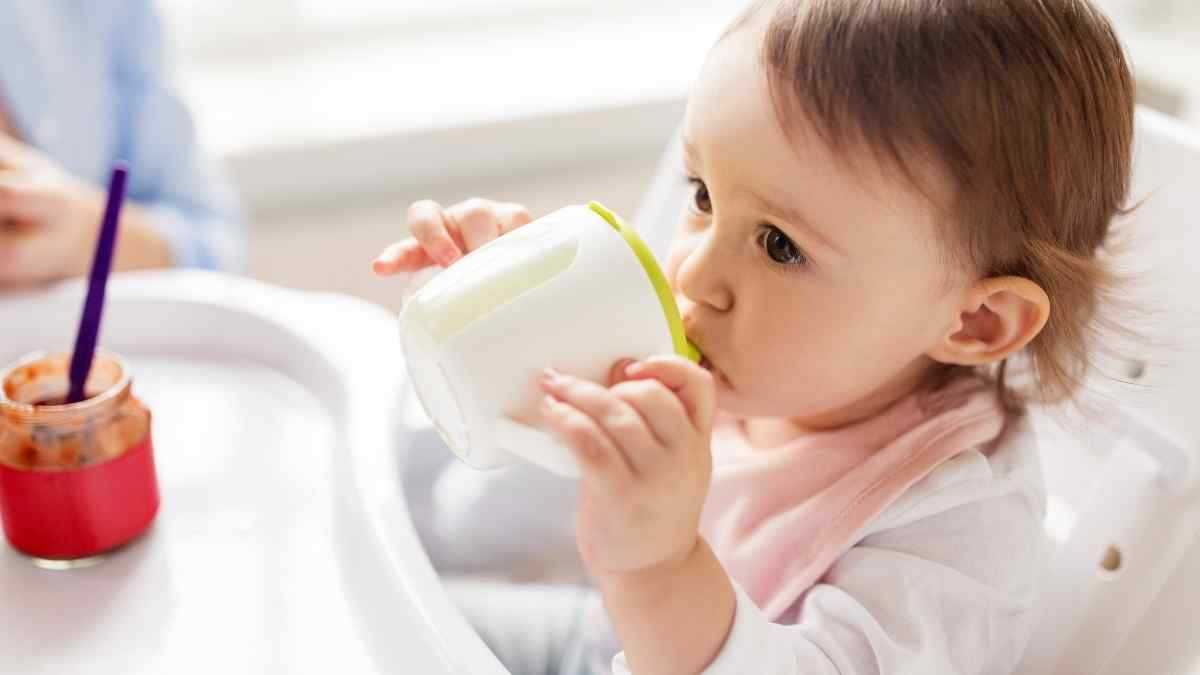
Myth 4: Babies Should Drink as Much Water as Adults Relative to Their Size
From distinguishing the natural body cooling mechanisms in babies to understanding dehydration signs, we’ve demystified some common misconceptions surrounding infant hydration. Another prevalent myth that has many parents perplexed is the idea that, when scaled down, babies should consume water similarly to adults. On its surface, it might seem logical—if an adult drinks eight glasses of water a day, shouldn’t a baby drink a proportional amount? Let’s unpack this myth and delve into the true nature of hydration for our youngest.
Differences in baby and adult hydration needs:
1. Nutrient-Rich Hydration: While adults might drink water throughout the day and occasionally replace sugary beverages with sports drinks or caffeinated beverages, infants receive a significant portion of their hydration from breast milk or formula. These aren’t just hydration sources; they’re packed with crucial nutrients tailored for a baby’s growth.
2. Physical Exertion Variances: Adults, after a workout or a stint in an exercise physiology laboratory, might down glasses of water or sports drinks to stay hydrated. However, babies, naturally less active, do not have the same fluid loss and thus, the same hydration needs.
3. Developmental Stages: The older ones among us have matured systems that can process and regulate liquids, whether they’re drinking caffeinated or non-caffeinated drinks. In contrast, a baby’s renal system is still in its developmental stages, affecting its ability to process excessive amounts of water.
Risks of overhydration in babies
1. Water Intoxication: Excess water can lead to a dilution of a baby’s internal salt balance levels. This condition, termed water intoxication, can produce alarming symptoms such as seizures or, in extreme cases, even kidney failure.
2. Feeling Overly Full: Overconsumption of water might make babies feel full, potentially leading them to drink less of their milk or formula. This can inadvertently cause them to lose weight or miss out on vital nutrients.
3. Straining Immature Kidneys: A baby’s kidneys aren’t fully equipped to filter large volumes of water like an adult’s can. Overburdening them with excess fluids can have detrimental effects on their functionality.
4. Nutrient Loss: Overhydration can cause essential nutrients to be flushed out from a baby’s system faster than they should, potentially hindering proper growth.
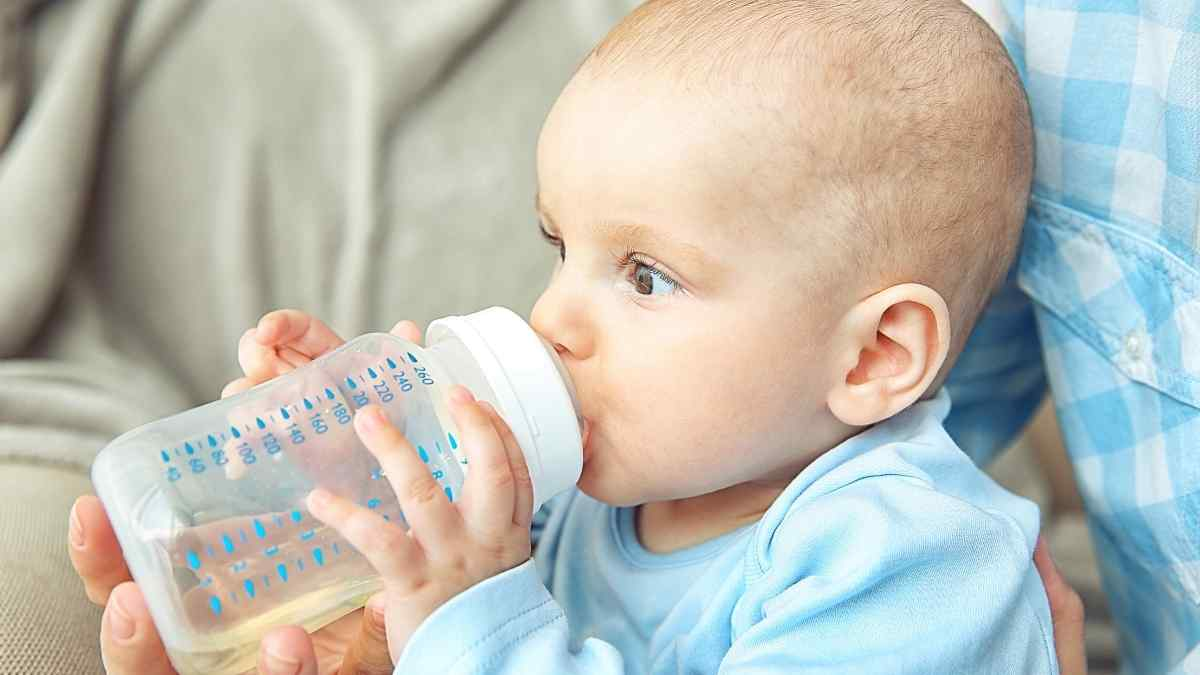
Conclusion
Hydration is an essential aspect of health at every stage of life, but understanding the nuances and unique requirements of infant hydration is of paramount importance. This article aimed to dispel the common myths surrounding baby hydration and shed light on the truths grounded in scientific evidence and expert knowledge.
From the assumption that newborns require water just like adults, to the misleading connection between teething and increased water intake, and the misunderstanding of a sweaty baby as a sign of dehydration, each myth underscores the vast difference between adult and infant hydration needs. And while it might seem intuitive to think of babies requiring water in proportion to their size, their developing systems and reliance on nutrient-rich sources of hydration like breast milk and formula paint a different picture.
In a world inundated with advice from various sources, staying informed and vigilant is essential. By debunking these myths, we aim to provide clarity and guidance to ensure our little ones grow up well-hydrated and healthy. Always consult with healthcare professionals for personalized advice and remember that each baby is unique. What works for one may not work for another, but armed with accurate knowledge, we can ensure the best care for our precious bundles of joy.
Did this article help you? Please let me know by leaving a comment below. If you have any questions about this topic, don’t hesitate to ask!



